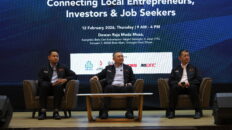Balancing Present Demands with Future Readiness
The 2025 Urban Readiness Report, launched by Expo City Dubai in partnership with YouGov, surveyed more than 1,000 city leaders globally. It reveals a growing dilemma: governments are under mounting pressure to deliver basic urban services while investing in long-term resilience amid rapid urbanisation and climate challenges.
Nearly three-quarters of city leaders say their efforts are constrained by funding shortfalls and governance gaps, slowing progress toward sustainable urban transformation. These findings will guide discussions at the 2025 Asia Pacific Cities Summit (APCS) & Mayors’ Forum, convened by Expo City Dubai under the patronage of His Highness Sheikh Hamdan bin Mohammed bin Rashid Al Maktoum, Crown Prince of Dubai and Chairman of The Executive Council of Dubai.
Climate Resilience vs Essential Services
The report highlights a pressing tension between environmental resilience and service delivery. Leaders are prioritising climate adaptation – addressing urban heat, flooding, and wildfires – while still struggling to provide affordable housing, healthcare, and efficient transport systems.
In Malaysia, 82% of city leaders cite funding limitations as the main barrier to long-term resilience – seven percentage points higher than the global average. Many leaders rely on public-private partnerships to bridge gaps in healthcare and infrastructure.
“As cities absorb burgeoning populations, they are increasingly vulnerable to social and climate-related pressures,” said Nadia Verjee, Executive Director, Global Initiatives and Advisory, Expo City Dubai. “These insights are the driving force behind 2025 APCS, which is designed to bring city leaders together to exchange ideas, develop new models and collaborate on solutions that will address the myriad of challenges confronting cities.”
Building Economic Inclusion and Communication
Malaysian city leaders identified economic inequality as one of the top five barriers to building cohesive societies. Consequently, 42% view entrepreneurship and economic opportunity as key to creating future-ready cities.
Moreover, 67% believe their cities communicate policies effectively – a significantly better result than the global average of 16% who said their cities failed to communicate decisions adequately.
Prioritising Quality of Life
Human-centric urban design continues to gain traction. In Malaysia, 81% of city leaders prioritise wellbeing, safety, and inclusion, compared to 71% globally. However, only 36% have embedded people-first policies across all planning processes, suggesting these initiatives remain project-based rather than systemic.
Accelerating Digital Transformation
The report also points to a digital divide in how cities leverage technology. While some advanced economies struggle with slow digital adoption, emerging markets – including Malaysia, the UAE, Saudi Arabia, and the Philippines – are rapidly evolving from ‘smart’ to ‘connected’ systems. About half of city leaders in these regions report using IoT and real-time data to improve urban planning and citizen engagement.
In India, 47% of cities now use digital twins and predictive analytics to simulate the impact of urban development on congestion, pollution, and energy use.
A Blueprint for Sustainable Cities
Expo City Dubai, located in the heart of Dubai’s growth corridor, exemplifies sustainable urban planning. Building on the legacy of Expo 2020 Dubai and COP28, it serves as a testbed for innovation and a platform for collaboration.
Rooted in its net-zero 2050 roadmap, the city is a living model of how global cooperation can propel sustainable progress and shape the next generation of resilient, inclusive cities.









